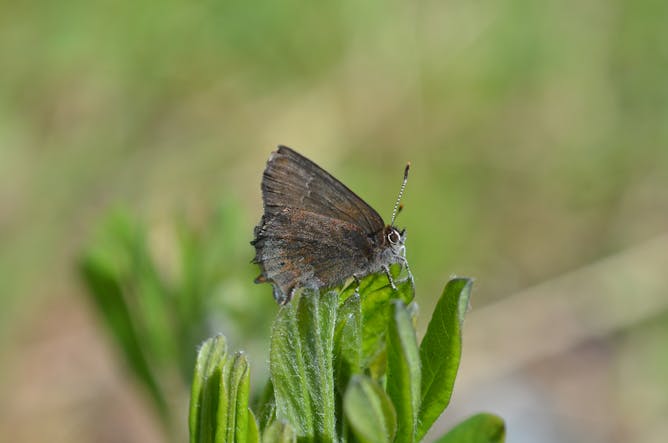
The Texas frosted elfin (Callophrys irus hadros), a small butterfly subspecies found only in Arkansas, Texas, Oklahoma and Louisiana, has lost most of its prairie habitat and is thought to have dramatically declined over the last century.
Matthew D. Moran
Matthew D. Moran, Hendrix College
Recent reports of dramatic declines in insect populations have sparked concern about an 'insect apocalypse.' But a new analysis of data from sites across North America suggests the case isn't proven.
|
Health
|
-
Steven Siegel, University of Southern California
Watching coronavirus coverage can cause anxiety in your child. An expert offers some tips that will help.
-
Margot Gage Witvliet, Lamar University
Margot Gage Witvliet went from being healthy and active to fearing she was dying almost overnight. An epidemiologist, she dug into the research to understand what's happening to long-haulers like her.
|
|
Politics + Society
|
-
John E. Finn, Wesleyan University
A Florida minister and a conservative lawmaker filed suit against a county law mandating mask wearing, saying it violates the freedom of religion. A constitutional law professor says they're wrong.
-
Jeffrey H. Cohen, The Ohio State University
The Zapotec people of southern Mexico have always relied on each other to solve problems when the government can't, or won't, help. That's proving to be a pretty effective pandemic response.
-
Shannon M. Smith, College of Saint Benedict & Saint John's University
Protests of Confederate flags and monuments have grown since 2015, but resistance is not new. African Americans have been protesting against Confederate monuments since they were erected.
|
|
Education
|
-
Robert Massa, University of Southern California
An enrollment specialist explains why colleges can or can't charge less for tuition amid the COVID-19 pandemic that has forced many to hold their classes online.
-
Lenette Azzi-Lessing, Boston University
Visits between foster children and their biological families are being disrupted and reunification hearings delayed.
|
|
Environment + Energy
|
-
Russ Schumacher, Colorado State University
Hurricane and tornado winds spin in circles, but there's another, equally dangerous storm type where winds barrel straight ahead. They're called derechos, and are most common in summer.
|
|

The wall of Moms group is the latest in a long tradition of mothers’ movements around the world.
Alisha Jucevic via Getty Images / AFP via Getty Images
Kelsy Kretschmer, Oregon State University
By inflicting violence on protesting moms, governments only amplify the message of the movement they seek to quell.
|
From our International Editions
|
-
Michael Baker, University of Otago; Amanda Kvalsvig, University of Otago; Nick Wilson, University of Otago
New Zealand is one of a small number of countries that have managed to eliminate community transmission of COVID-19. It's close to a 100-day milestone with no new cases in the community.
-
Neil R Jordan, UNSW; Cameron Radford, UNSW; Tracey Rogers, UNSW
Many carnivores are ambush predators. Being seen by their prey can lead to them abandoning the hunt.
-
Geoffrey Bird, Royal Roads University
Seventy-five years after the atomic bomb was dropped on Hiroshima and Nagasaki, the people of Délı̨nę remain affected by Canada's role in the attack. A documentary presents their stories.
|
|